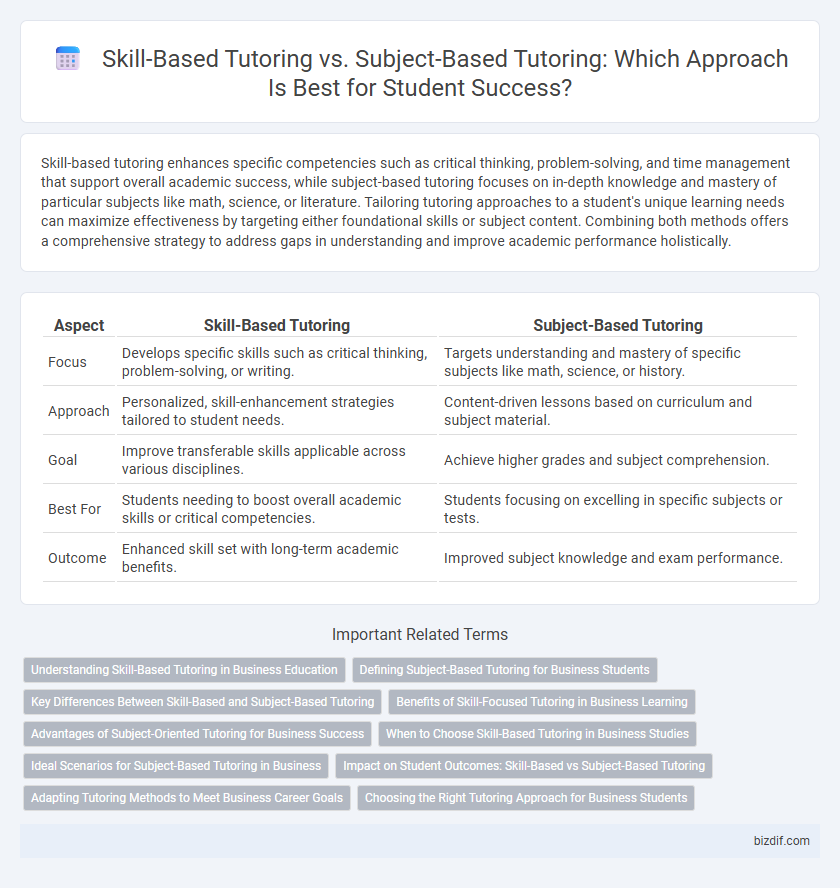Skill-based tutoring enhances specific competencies such as critical thinking, problem-solving, and time management that support overall academic success, while subject-based tutoring focuses on in-depth knowledge and mastery of particular subjects like math, science, or literature. Tailoring tutoring approaches to a student's unique learning needs can maximize effectiveness by targeting either foundational skills or subject content. Combining both methods offers a comprehensive strategy to address gaps in understanding and improve academic performance holistically.
Table of Comparison
| Aspect | Skill-Based Tutoring | Subject-Based Tutoring |
|---|---|---|
| Focus | Develops specific skills such as critical thinking, problem-solving, or writing. | Targets understanding and mastery of specific subjects like math, science, or history. |
| Approach | Personalized, skill-enhancement strategies tailored to student needs. | Content-driven lessons based on curriculum and subject material. |
| Goal | Improve transferable skills applicable across various disciplines. | Achieve higher grades and subject comprehension. |
| Best For | Students needing to boost overall academic skills or critical competencies. | Students focusing on excelling in specific subjects or tests. |
| Outcome | Enhanced skill set with long-term academic benefits. | Improved subject knowledge and exam performance. |
Understanding Skill-Based Tutoring in Business Education
Skill-based tutoring in business education emphasizes developing core competencies such as critical thinking, financial analysis, and strategic decision-making, fostering practical abilities essential for real-world applications. This approach enhances students' problem-solving skills and adaptability, supporting career readiness more effectively than traditional subject-based tutoring focused on theoretical knowledge. Tailored skill-building sessions address individual learning gaps, promoting continuous improvement and measurable outcomes in business proficiency.
Defining Subject-Based Tutoring for Business Students
Subject-based tutoring for business students concentrates on mastering specific disciplines such as accounting, finance, marketing, or management principles. This approach tailors instruction to the detailed content, terminology, and methodologies unique to each business subject, enabling deeper comprehension and application in academic and professional contexts. Emphasizing subject-based tutoring supports targeted exam preparation and practical problem-solving skills essential for business success.
Key Differences Between Skill-Based and Subject-Based Tutoring
Skill-based tutoring focuses on developing specific abilities like critical thinking, problem-solving, or writing skills across various subjects, enhancing overall academic performance. Subject-based tutoring targets particular academic disciplines such as math, science, or history, providing in-depth knowledge and support in that field. The key difference lies in skill-based tutoring's emphasis on transferable competencies, while subject-based tutoring concentrates on mastering content within a specific subject area.
Benefits of Skill-Focused Tutoring in Business Learning
Skill-based tutoring in business learning enhances critical competencies such as problem-solving, communication, and decision-making, directly applicable to real-world scenarios. This approach fosters adaptability and practical expertise, enabling students to navigate dynamic business environments more effectively than traditional subject-based tutoring. Emphasizing skill development cultivates confidence and strategic thinking, essential for leadership and innovation in competitive markets.
Advantages of Subject-Oriented Tutoring for Business Success
Subject-oriented tutoring offers businesses targeted expertise that aligns directly with industry-specific knowledge, enhancing employee competency and productivity. By focusing on core subjects relevant to the business, such as finance, marketing, or IT, companies can ensure skill development that supports strategic goals and operational efficiency. This approach leads to measurable improvements in job performance, higher employee confidence, and a competitive advantage in the marketplace.
When to Choose Skill-Based Tutoring in Business Studies
Skill-based tutoring in business studies is essential when students need to develop practical competencies such as financial analysis, strategic planning, and data interpretation rather than just theoretical knowledge. This approach enhances critical thinking and problem-solving skills crucial for real-world business scenarios. Opt for skill-based tutoring when the goal is to improve applied expertise for career readiness or professional advancement.
Ideal Scenarios for Subject-Based Tutoring in Business
Subject-based tutoring in business is ideal for learners aiming to deepen expertise in specific areas such as finance, marketing, or entrepreneurship, enabling targeted knowledge acquisition and practical application. This approach suits professionals preparing for certifications like CPA or PMP, where mastery of distinct subjects is critical for success. Subject-based tutoring facilitates focused skill development aligned with industry standards and career advancement goals.
Impact on Student Outcomes: Skill-Based vs Subject-Based Tutoring
Skill-based tutoring enhances critical thinking, problem-solving, and adaptability, directly improving students' ability to apply knowledge across subjects and fostering long-term academic success. Subject-based tutoring targets specific content mastery, leading to immediate improvements in test scores and understanding within a particular discipline. Combining both approaches can maximize student outcomes by addressing foundational skills while reinforcing subject expertise for comprehensive academic growth.
Adapting Tutoring Methods to Meet Business Career Goals
Skill-based tutoring emphasizes practical competencies like communication, problem-solving, and project management, directly aligning with specific business career goals. Subject-based tutoring focuses on foundational knowledge in areas such as finance, marketing, or economics, essential for technical expertise in business roles. Adapting tutoring methods to a blend of both approaches ensures learners develop versatile skills and subject mastery critical for advancing in competitive business environments.
Choosing the Right Tutoring Approach for Business Students
Skill-based tutoring enhances business students' practical abilities such as critical thinking, communication, and problem-solving, equipping them for real-world challenges. Subject-based tutoring focuses on mastering specific academic content like accounting principles, marketing strategies, or finance theories, ensuring strong foundational knowledge. Selecting the right approach depends on individual learning goals, with skill-based tutoring ideal for applied competence and subject-based tutoring best for conceptual understanding.
Skill-Based Tutoring vs Subject-Based Tutoring Infographic

 bizdif.com
bizdif.com